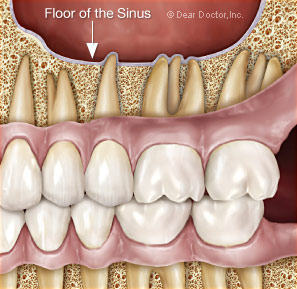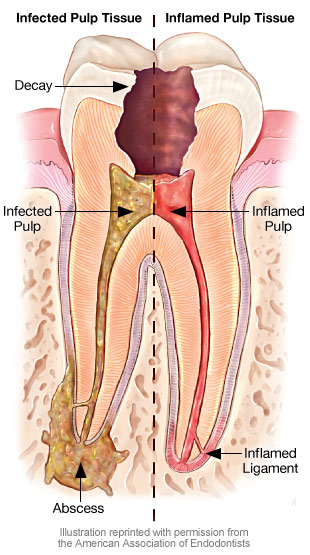Tooth Pain? Don't Wait!
Early interception can save emotional, physical and financial stress
 Dear Doctor,
Dear Doctor,
I have been having tooth pain. What are the likely causes, and what can be done?
Dear Brad,
Generally speaking, pain is a protective response that ranges from minor sensitivity to severe pain and informs the body that something is wrong. As for tooth pain, it is caused by a reaction of the nerves inside a tooth's pulp chamber with the severity dependent upon the type and degree of the stimulus. What follows are some examples of symptoms you may be feeling and their possible causes.
Symptom: Sensitivity to hot or cold foods and liquids.
Possible problem: If discomfort lasts only moments, sensitivity generally does not signal a serious problem. It may be caused by; a small area of decay in a tooth, a loose filling or an exposed root surface resulting from gum recession and possibly toothbrush abrasion.
What to do: If a root surface is sensitive, keep it clean and free of dental bacterial plaque. Use a soft toothbrush, cleaning very gently at the gum line, and brush no more than twice daily. Try using fluoride-containing toothpaste made for sensitive teeth. You can even try using toothpaste like an ointment, rubbing it into the root surface for ten minutes or so at a time. If the sensitivity continues, see your dentist.
 Symptom: Sensitivity to hot or cold foods after dental treatment.
Symptom: Sensitivity to hot or cold foods after dental treatment.
Possible problem: Dental work may result in tooth sensitivity due to inflammation of the pulp tissues inside a tooth.
What to do: This sensitivity should last no longer then a few days; however, if decay has recently been removed or a filling or crown recently has been placed, a tooth may take a week or two to settle. Mild pain relievers like acetaminophen, aspirin or ibuprofen should help. If the pain persists or worsens, see your dentist.
 Symptom: Sharp pain when biting down on food.
Symptom: Sharp pain when biting down on food.
Possible problem: Decay, a loose filling and/or a cracked tooth are possible causes.
What to do: See a dentist to diagnose the problem before the pain worsens. Decay will need to be removed, and a loose filling replaced by your dentist. If the pain is caused by pulp tissue damage, your dentist may send you to an endodontist (“endo” – inside; “dont” – tooth), a specialist who will perform a root canal treatment to clean out the damaged pulp, disinfect the root canal and fill and seal the remaining space to save the tooth. A cracked tooth may be difficult to treat not only if it involves the pulp, but also depending on the location and depth of the crack. (See the Dear Doctor magazine article on “Cracked Tooth Syndrome”)
 Symptom: Lingering pain after eating hot or cold foods and liquids.
Symptom: Lingering pain after eating hot or cold foods and liquids.
Possible problem: This probably means the pulp is inflamed and/or dying, and may be irreversibly damaged usually as a result of deep decay or physical trauma.
What to do: See your dentist or endodontist to diagnose the problem before the pain becomes severe due to the development of an abscess. The tooth will likely need root canal treatment to remove the dying or dead pulp tissue to save the tooth.
 Symptom: Dull ache and pressure in the upper teeth and sinus area of one or both sides.
Symptom: Dull ache and pressure in the upper teeth and sinus area of one or both sides.
Possible problem: Pain felt in the sinus area of the face is often associated with the upper back teeth because they share the same nerves. The origin of this “referred” pain consequently may be difficult to determine. Therefore, sinus pain can feel like tooth pain and vice versa. That's why sinus congestion from a cold or flu can cause pain in the upper teeth. Additionally it's also important to determine if clenching or grinding is a factor, as they too cause similar symptoms.
What to do: See your dentist or endodontist to find out if the symptoms are dentally related; otherwise, you may need to see your family physician. However, don't wait until the pain worsens.
Symptom: Acute and constant pain from an area, but difficult to say exactly which tooth is causing the problem.
 Possible problem: The pulp tissue inside a tooth is acutely infected, inflamed and dying. This is generally in response to decay coming very close to or entering the nerve.
Possible problem: The pulp tissue inside a tooth is acutely infected, inflamed and dying. This is generally in response to decay coming very close to or entering the nerve.
What to do: See your dentist or endodontist immediately for a thorough examination. Once the problematic tooth is isolated, a root canal treatment to remove the infected pulp tissue will bring relief while saving the tooth. Untreated, the pain could become worse.
Symptom: Constant severe pain and pressure, swelling of the gum and sensitivity to touch.
Possible problem: A tooth may have an infection/abscess that has spread from the pulp into the surrounding periodontal tissues (“peri” – around; “odont” – tooth) and bone.
What to do: See your dentist or endodontist immediately. A root canal will probably be required. Over-the-counter medications like acetaminophen and ibuprofen will help minimize symptoms until you are treated.
Don't wait for the pain to get worse.
Note in the above examples, possible problems and solutions are suggested — but they only provide possible guidelines. In all cases of tooth or jaw pain or discomfort in and around the teeth and jaws, see your dentist as soon as possible for a proper evaluation and treatment. Your dentist may refer you to an endodontist for diagnosis and treatment, especially if the issue is related to a root canal problem. And if your pain has a medical component, your dentist or endodontist will refer you to a physician.


